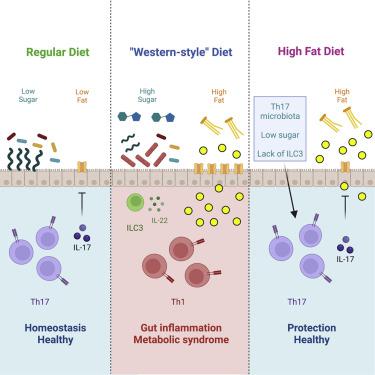Cell ( IF 64.5 ) Pub Date : 2022-08-29 , DOI: 10.1016/j.cell.2022.08.005 Yoshinaga Kawano 1 , Madeline Edwards 1 , Yiming Huang 2 , Angelina M Bilate 3 , Leandro P Araujo 1 , Takeshi Tanoue 4 , Koji Atarashi 4 , Mark S Ladinsky 5 , Steven L Reiner 6 , Harris H Wang 7 , Daniel Mucida 8 , Kenya Honda 4 , Ivaylo I Ivanov 1

|
How intestinal microbes regulate metabolic syndrome is incompletely understood. We show that intestinal microbiota protects against development of obesity, metabolic syndrome, and pre-diabetic phenotypes by inducing commensal-specific Th17 cells. High-fat, high-sugar diet promoted metabolic disease by depleting Th17-inducing microbes, and recovery of commensal Th17 cells restored protection. Microbiota-induced Th17 cells afforded protection by regulating lipid absorption across intestinal epithelium in an IL-17-dependent manner. Diet-induced loss of protective Th17 cells was mediated by the presence of sugar. Eliminating sugar from high-fat diets protected mice from obesity and metabolic syndrome in a manner dependent on commensal-specific Th17 cells. Sugar and ILC3 promoted outgrowth of Faecalibaculum rodentium that displaced Th17-inducing microbiota. These results define dietary and microbiota factors posing risk for metabolic syndrome. They also define a microbiota-dependent mechanism for immuno-pathogenicity of dietary sugar and highlight an elaborate interaction between diet, microbiota, and intestinal immunity in regulation of metabolic disorders.
中文翻译:

膳食糖引起的微生物群失衡破坏了免疫介导的代谢综合征保护作用
肠道微生物如何调节代谢综合征尚不完全清楚。我们发现肠道微生物群通过诱导共生特异性 Th17 细胞来防止肥胖、代谢综合征和糖尿病前期表型的发生。高脂肪、高糖饮食通过消耗 Th17 诱导微生物促进代谢疾病,而共生 Th17 细胞的恢复恢复了保护。微生物诱导的 Th17 细胞通过以 IL-17 依赖性方式调节肠上皮的脂质吸收来提供保护。饮食引起的保护性 Th17 细胞丧失是由糖的存在介导的。消除高脂肪饮食中的糖可以保护小鼠免受肥胖和代谢综合征的影响,其方式依赖于共生特异性 Th17 细胞。糖和 ILC3 促进了啮齿类动物 Faecalibaculum的生长,从而取代了诱导 Th17 的微生物群。这些结果定义了导致代谢综合征风险的饮食和微生物群因素。他们还定义了膳食糖的免疫致病性的微生物群依赖性机制,并强调了饮食、微生物群和肠道免疫在代谢紊乱调节中的复杂相互作用。

































 京公网安备 11010802027423号
京公网安备 11010802027423号